An autodidact and polymath, Robert Smithson cemented himself as one of the pre-eminent land artists in his short lifetime. Along with his fellow artist and wife Nancy Holt, Smithson pioneered a new way of working that explored connections to the landscape and place and endlessly probed the formation of knowledge.
When he died in a plane crash in 1973 at just 35 years old, he left behind a vast personal library that represented his broad interests: there were books on crystals and rock minerals, dinosaurs and insects, myths and children’s rhymes, and classics like James Joyce’s Finnegan’s Wake and Jorge Luis Borges’ Ficciones. Holt donated the entirety of Smithson’s collection— approximately 1,120 books—to the Archives of American Art after his death, where it’s still housed today.

There’s also, though, another way to peek into the narratives and materials that shaped Smithson’s thinking and practice. In 2019, Conrad Bakker completed a five-year-long project of recreating every title in that original collection on a 1:1 scale. Presented in museums and galleries from Utah to Arkansas to New York, “Untitled Project: Robert Smithson Library & Book Club” is both a painstaking ode to the pioneering artist and a bold consideration of how we access and consume information.
“I can’t really remember my first encounter with Robert Smithson, but I’ve always been a fan of his artwork and, in particular, the way he oriented his sculptures to coexist inside the physical space of a gallery and outside in the landscape,” Bakker says. He first encountered the artist’s library through Ann Reynolds’ Robert Smithson: Learning from New Jersey and Elsewhere, which provided a comprehensive catalog of each title and edition in the collection.
“I was captivated by this wonderful list of books and curious about the diversity of his research subjects, the intensity of his self-education through books,” Bakker says, adding that the library also serves as a “time capsule of artistic research of the 1960s. I imagined this collection of books as an extension of Robert Smithson’s mind, his curiosity, and thinking.”
This prompted one component of Bakker’s ongoing Untitled Projects, a practice of recreating everyday objects like chocolate bars or VHS tapes to explore facets of economic systems, production, and consumption. Using images from online booksellers, he carved and painted wooden replicas of each edition.

Displayed in cardboard-like boxes and stacked on the floor, Bakker’s collection has taken many forms, from room-sized installations to a full-scale bookstore in the storefront of the Famous Hardware building in Springdale, Arkansas. While the library remains intact in his studio, the “Book Club” also allowed collectors to purchase a second sculpture for a time. He created about 350 additional works for this element of the project.
The library is just one part of Bakker’s interest in books as objects, which includes a used paperback sale and an archive of self-help titles from the 1970s. For the artist, these objects offer numerous lines of inquiry from “books as historical records of culture and personal memories, books as
commodities, bookstores as public spaces, books as (outdated) technology, and books as portable containers of information, instructions, and ideas,” he writes.
Bakker is currently working on several projects, including a full-scale copy shop (think 1980s-era Kinko’s) for The Weather Station in Lafayette, Indiana. In early 2026, he’ll also show a piece connecting capitalism and climate change at the Boulder Museum of Contemporary Art. The library is likely headed to Stockholm in the coming months, but keep an eye on the project’s Instagram for more.
You might also enjoy Bernie Kaminski’s papier-mâché objects and Matt Stevens’ Good Movies as Old Books.





















